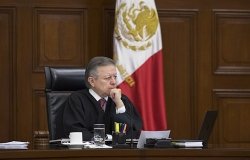#103 Political Change and Political Reform in an Authoritarian Regime: The Case of Mexico
By Kevin J. Middlebrook
Abstract
Three sets of questions underlie this analysis of political transition in an authoritarian regime. First, what were the origins of the Lopez Portillo political reform? What factors, forces, and motives counted for this regime-sponsored effort at political liberalization? How did factors such as the regime's sociopolitical bases and its institutional structure affect the initiation and direction of the transition process? Second, what were the characteristics of the reform process itself? How was the 1977 political reform related to the structure and dynamics of Mexico's governing "revolutionary coalition?" Who were the relevant sociopolitical actors within the authoritarian regime, and how did they influence the characteristics of the reform process? What conditions surrounded the implementation of the 1977 political reform, and how have they affected the accomplishment of the reform's stated goals? Third, what are the consequences of this liberalization process? Even though the reform process has so far been much less open-ended than other cases of transition from authoritarian rule in Latin America and Latin Europe, to what extent do regime-sponsored political reforms and liberalization efforts such as that initiated by the Lopez Portillo administration create broader pressures for--and possibilities of--regime transformation? What specific political conditions and elite choices are necessary to promote change resulting in the adoption of more democratic procedures and institutions? What theoretically generalizable insights does the Mexican case contribute to an examination of the broader question of regime-sponsored liberalization and/or democratization? These are among the questions and problems which this essay will examine.
Related Programs

Latin America Program
The Wilson Center’s prestigious Latin America Program provides non-partisan expertise to a broad community of decision makers in the United States and Latin America on critical policy issues facing the Hemisphere. The Program provides insightful and actionable research for policymakers, private sector leaders, journalists, and public intellectuals in the United States and Latin America. To bridge the gap between scholarship and policy action, it fosters new inquiry, sponsors high-level public and private meetings among multiple stakeholders, and explores policy options to improve outcomes for citizens throughout the Americas. Drawing on the Wilson Center’s strength as the nation’s key non-partisan policy forum, the Program serves as a trusted source of analysis and a vital point of contact between the worlds of scholarship and action. Read more

Mexico Institute
The Mexico Institute seeks to improve understanding, communication, and cooperation between Mexico and the United States by promoting original research, encouraging public discussion, and proposing policy options for enhancing the bilateral relationship. A binational Advisory Board, chaired by Luis Téllez and Earl Anthony Wayne, oversees the work of the Mexico Institute. Read more









